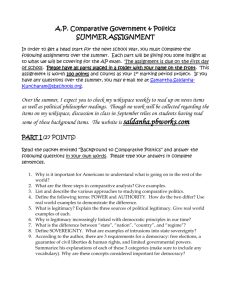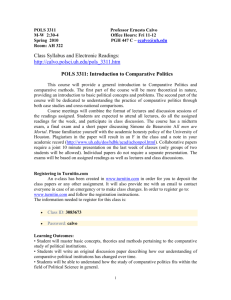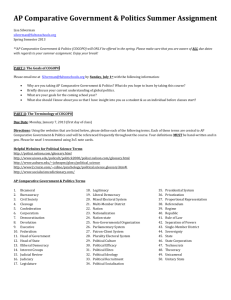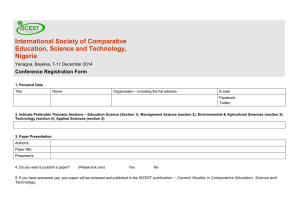View/Open
advertisement
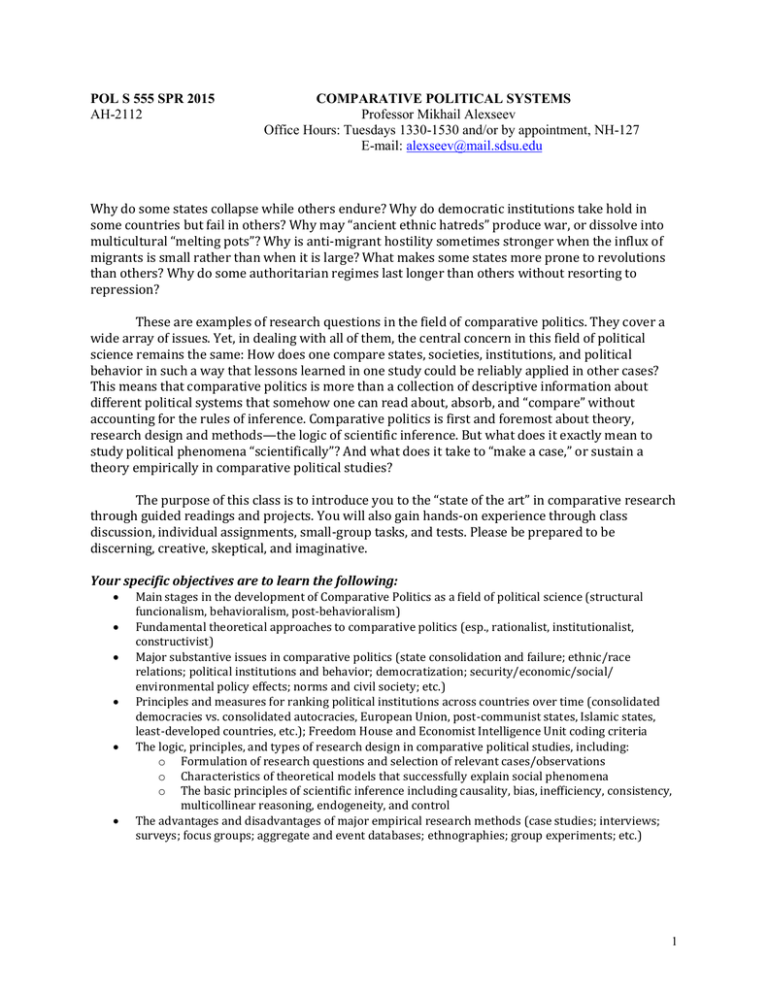
POL S 555 SPR 2015 AH-2112 COMPARATIVE POLITICAL SYSTEMS Professor Mikhail Alexseev Office Hours: Tuesdays 1330-1530 and/or by appointment, NH-127 E-mail: alexseev@mail.sdsu.edu Why do some states collapse while others endure? Why do democratic institutions take hold in some countries but fail in others? Why may “ancient ethnic hatreds” produce war, or dissolve into multicultural “melting pots”? Why is anti-migrant hostility sometimes stronger when the influx of migrants is small rather than when it is large? What makes some states more prone to revolutions than others? Why do some authoritarian regimes last longer than others without resorting to repression? These are examples of research questions in the field of comparative politics. They cover a wide array of issues. Yet, in dealing with all of them, the central concern in this field of political science remains the same: How does one compare states, societies, institutions, and political behavior in such a way that lessons learned in one study could be reliably applied in other cases? This means that comparative politics is more than a collection of descriptive information about different political systems that somehow one can read about, absorb, and “compare” without accounting for the rules of inference. Comparative politics is first and foremost about theory, research design and methods—the logic of scientific inference. But what does it exactly mean to study political phenomena “scientifically”? And what does it take to “make a case,” or sustain a theory empirically in comparative political studies? The purpose of this class is to introduce you to the “state of the art” in comparative research through guided readings and projects. You will also gain hands-on experience through class discussion, individual assignments, small-group tasks, and tests. Please be prepared to be discerning, creative, skeptical, and imaginative. Your specific objectives are to learn the following: Main stages in the development of Comparative Politics as a field of political science (structural funcionalism, behavioralism, post-behavioralism) Fundamental theoretical approaches to comparative politics (esp., rationalist, institutionalist, constructivist) Major substantive issues in comparative politics (state consolidation and failure; ethnic/race relations; political institutions and behavior; democratization; security/economic/social/ environmental policy effects; norms and civil society; etc.) Principles and measures for ranking political institutions across countries over time (consolidated democracies vs. consolidated autocracies, European Union, post-communist states, Islamic states, least-developed countries, etc.); Freedom House and Economist Intelligence Unit coding criteria The logic, principles, and types of research design in comparative political studies, including: o Formulation of research questions and selection of relevant cases/observations o Characteristics of theoretical models that successfully explain social phenomena o The basic principles of scientific inference including causality, bias, inefficiency, consistency, multicollinear reasoning, endogeneity, and control The advantages and disadvantages of major empirical research methods (case studies; interviews; surveys; focus groups; aggregate and event databases; ethnographies; group experiments; etc.) 1 Required Readings I. BOOKS (ordered through the Aztec Bookstore or they can be obtained elsewhere): Gary King, Robert Keohane, and Sidney Verba, Designing Social Inquiry: Scientific Inference in Qualitative Research, Princeton, 1994 Ian Bremmer, The J Curve: A New Way to Understand Why Nations Rise and Fall Simon and Schuster, 2007. Henry Hale, Patronal Politics: Eurasian Regime Dynamics in Comparative Perspective, Cambridge University Press, 2014. Randall Wood and Carmine DeLuca, Dictator's Handbook: A Practical Manual for the Aspiring Tyrant. Gull Pond Books, 2012. Eric McGlinchey. Chaos, Violence, Dynasty: Politics and Islam in Central Asia, Pittsburg University Press, 2010. Anna Politkovskaya, A Small Corner of Hell: Dispatches from Chechnya, Chicago, 2003. Mikhail Alexseev, Immigration Phobia and the Security Dilemma: Russia, Europe, and the United States, Cambridge University Press, 2006. II. OTHER SOURCES: ◊ ◊ All readings listed under Schedule of Readings and Activities under the weekly reading assignments are required. Evidence of regular reading on political developments in different parts of the world in at least one of the following sources: --The Economist --The New York Times --The Washington Post --BBC World Service Grade Components Attendance Class activities and presentations Midterm assignment (a brief on political instability) Midterm Analytic Review (Chechnya conflict) Final course paper 10% 30% 10% 20% 30% Class activities will include (but will not be limited to) lectures, question-and-answer sessions, student presentations followed by discussions/debates, small-group/“task force” projects, and miscellaneous small assignments. You are expected to attend all class meetings and participate in class activities. Attendance score will be calculated as a percentage of class meetings you attended (minus one for gratis absences);* participation score will be calculated as a percentage of 2 completed/submitted class assignments—if the latter exceed the average in scope of the material coverage, additional bonus points will be earned. The brief and the analytic review are defined in the Class Meetings and Reading Schedule. The final course paper topics will be presented and discussed in class as specified in the Class Meetings and Reading Schedule. The principal focus will be on forecasting political trajectories of select countries in a way that draws on most important theoretical and substantive insights derived from course readings and class discussions. *One absence is allowed without explanation at no loss of points; over one absence, absences do not earn credit, even if excused; makeups allowable only under documented force majeur circumstances (by legal definition) Grade Scales for Tests, Papers and Final Grade Assignment: 95-100 = A 73-76 = C 90-94 = A70-72 = C- 87-89 = B + 67-69 = D+ 83-86 = B 63-66 = D 80-82 = B60-62 = D- 77-79 = C+ < 59 = F For criteria satisfying the grade ranges see http://www-rohan.sdsu.edu/~digger/305/grades.html. NOTE: Plagiarism (copying other people’s work without attribution and presenting it as your own) is unacceptable. Engaging in plagiarism on any test will result in an automatic “F” grade for the course. Blackboard at SDSU You will use SDSU Blackboard to access announcements, the syllabus, readings, and assignments online; to participate in discussion forums; and submit the final exam. FOR STUDENTS WITH DISABILITIES If you are a student with a disability and believe you will need accommodations for this class, it is your responsibility to contact Student Disability Services at (619) 594-6473. To avoid any delay in the receipt of your accommodations, you should contact Student Disability Services as soon as possible. Please note that accommodations are not retroactive, and that accommodations based upon disability cannot be provided until you have presented your instructor with an accommodation letter from Student Disability Services. Your cooperation is appreciated. 3 CLASS MEETINGS AND READING SCHEDULE Except for the first day of class, your best bet is to do all your required readings prior to the class meetings of the week for which they are assigned. Required readings are listed below under each week’s topic. Please bring the required readings to class on the ways when they are assigned or required by the syllabus. Week 1 Jan 27 Introduction: Evolution of Comparative Politics in Political Science Munck, “The Past and Present of Comparative Politics,” in Geraldo L. Munck and Richard Snyder, Passion, Craft, and Method in Comparative Politics, The Johns Hopkins University Press, 2007 (Blackboard, Course Documents—hereafter BB). Week 2 Feb 3 Comparative Classification of Political Systems: Freedom House --Freedom House, Nations in Transit 2014 (https://freedomhouse.org/report/nations-transit/nations-transit-2014#.VML5XM3n9Lf) Summaries --Eurasia’s Rupture with Democracy: https://freedomhouse.org/report/nations-transit2014/nations-transit-2014-eurasias-rupture-democracy#.VML5is3n9Lc --Charts and Graphs: https://freedomhouse.org/report/nations-transit-2014/nationstransit-2014-eurasias-rupture-democracy#.VML5is3n9Lc --Methodology: https://freedomhouse.org/report/nations-transit-2014/nations-transit2014-methodology#.VML6FM3n9Lc Country Reports: --Russia (https://freedomhouse.org/report/nations-transit/2014/russia#.VML32s3n9Lc) --Belarus (https://freedomhouse.org/report/nationstransit/2014/belarus#.VML4383n9Lc) --Ukraine (https://freedomhouse.org/report/nationstransit/2014/ukraine#.VML5CM3n9Lc) NOTE: You can download PDFs of these documents from the website. Bring all these documents (hard copy or electronic format if you are using a laptop/PDA etc.) to class. [If the link malfunctions, Google Freedom House, click on Nations in Transit, then, on the pulldown menu click 2013]. --CLASS EXERCISE Week 3 Feb 10 Comparative Classification of Political Systems: Economist Intelligence Unit -EIU, “Democracy Index 2014: Democracy and Its Discontents” (BB) (In particular, pay close attention to the coding methods at the end of the report and compare scores on Russia, Belarus and Ukraine with those of Freedom House) 4 --Fareed Zakaria, “The Rise of Illiberal Democracy,” Foreign Affairs (Nov 1997) (http://www.fareedzakaria.com/ARTICLES/other/democracy.html) --CLASS EXERCISE Week 4 Feb 17 Political In/Stability Bremmer, J-Curve, Chs. 1, 7 CLASS PRESENTATIONS: Presenters The Far Left Side of the J Curve Bremmer, Ch. 2 North Korea ___________________________________________________ ___________________________________________________ Cuba ___________________________________________________ ___________________________________________________ The Slide Toward Instability Bremmer, Ch. 3 Iran ___________________________________________________ ___________________________________________________ Saudi Arabia ___________________________________________________ ___________________________________________________ Russia ___________________________________________________ ___________________________________________________ The Depths of the J Curve Bremmer, Ch. 4. Yugoslavia ___________________________________________________ ___________________________________________________ The Right Side of the Curve Bremmer, Ch. 5 Turkey ___________________________________________________ ___________________________________________________ 5 Israel ___________________________________________________ ___________________________________________________ India ___________________________________________________ ___________________________________________________ Case Dilemma Bremmer, Ch. 6: China ___________________________________________________ ___________________________________________________ Week 5 Feb 24 MIDTERM ASSIGNMENT: Political Stability Case Study: Ukraine --BEFORE CLASS: Write a 3-page brief (not exceeding 1,200 words) on how the J-Curve theory applies to current developments in Ukraine. On an additional sheet draw the J-Curve for Ukraine. You will make a quick (2-min) presentation of the graph in class. ***ALL BRIEFS AND GRAPHS ARE DUE IN HARD COPY AT THE BEGINNING OF CLASS*** (Grade deductions apply for submissions 10 min. late or more). Week 6 Mar 3 Regime Cycles: Patronal Politics in Eurasia ---Henry Hale, Patronal Politics 1. Introduction [EVERYONE] CLASS PRESENTATIONS: Presenters -2. Patronal politics and the great power of expectations________________________________________________ -3. A patronal-politics reinterpretation of Eurasian history______________________________________________ -4. Constitutions, elections, and regime dynamics ________________________________________________ -5. The emergence of networks and constitutions ________________________________________________ -6. The building of Eurasia's great power pyramids ________________________________________________ -7. Revolutions and other presidential ousters ________________________________________________ -8. Non-revolution in post-Soviet presidential systems _______________________________________________ 6 -9. After revolution ________________________________________________ -10. Patronal parliamentarism ________________________________________________ -11. Explaining post-Soviet regime dynamics ________________________________________________ -12. Patronal politics in global comparative perspective.________________________________________________ ***SEARCH THE WEB AND FIND THREE IMAGES THAT YOU BELIEVE ILLUSTRATE THE CONTENT OF THE CHAPTER YOU ARE PRESENTING PARTICULARLY WELL. PRESENT IN CLASS THE IMAGES AND EXPLAIN WHY THEY ARE GOOD ILLUSTRATIONS OF THE CHAPTER.*** Week 7 Mar 10 Authoritarian Durability and Democratization --Wood and DeLuca, Dictator's Handbook [EVERYONE] SUMMARY ASSIGNMENT ***Book summaries (max. 2 pages, under 800 words) due in hard copy at the beginning of class. KEY: List what you think are the three most effective methods/techniques that dictators could use to stay in power. Discuss why these three and not at least two other methods discussed in the book. CLASS EXERCISE [Bring the readings to class. Before class, figure out the piece’s main argument): WORK GROUP 1: --Jay Ulfelder, “Contentious Collective Action and the Breakdown of Authoritarian Regimes,” International Political Science Review 26 (2005): 311-334 ___________________________________________________ ___________________________________________________ ___________________________________________________ ___________________________________________________ ___________________________________________________ ___________________________________________________ WORK GROUP 2: --Jennifer Gandhi and Adam Przeworski, “Authoritarian Institutions and the Survival of Autocrats,” Comparative Political Studies 40 (2007): 1279-1301. ___________________________________________________ ___________________________________________________ ___________________________________________________ ___________________________________________________ ___________________________________________________ ___________________________________________________ 7 WORK GROUP 3: --Milan W. Svolik, “Power Sharing and Leadership Dynamics in Authoritarian Regimes,” American Journal of Political Science 53 (2009): 477-494 (BLACKBOARD, Course Documents) ___________________________________________________ ___________________________________________________ ___________________________________________________ ___________________________________________________ ___________________________________________________ ___________________________________________________ Week 8 Mar 17 Models of Intra-State Violence: Grievances, Opportunity and Security Dilemmas Laitin and Fearon, “Ethnicity, Insurgency, and Civil War,” American Political Science Review (February 2003): 75-91 (PROQUEST) Jack Goldstone, Robert Bates, Ted Robert Gurr et al., “A Global Forecasting Model of Political Instability,” Paper, American Political Science Association, Annual Meeting 2005 (BLACKBOARD) --Mikhail Alexseev, “Back to Hell: Civilian-Military ‘Audience Costs’ and Russia’s Wars in Chechnya,” Chapter 4 in Stephen L. Webber and Jennifer G. Mathers, eds., The Military and Society in Post-Soviet Russia (Manchester University Press, 2005). (BB) Week 9 Mar 24 RESEARCH WEEK--MIDTERM ANALYTIC REVIEW: Civil Wars and Insurgency: Violent Conflict in Chechnya in Comparative Perspective (USE CLASS TIME TO WRITE THE REVIEW) --Politkovskaya, A Small Corner of Hell REVIEW QUESTION: WHAT WOULD POLITKOVSKAYA SAY—BASED ON HER BOOK—ABOUT EXPLANATIONS OF CIVIL WAR REVIEWED IN THE READINGS OF WEEK 8? WITH WHICH EXPLANATIONS WOULD SHE AGREE THE MOST? WITH WHICH WOULD SHE DISAGREE THE MOST? WHY? (up to 4 pages (1,600 words max.) ***ANALYTIC REVIEW DUE MAR 24 by 1900 ON BLACKBOARD->AssignmentsTurnitin Assignment -BBC Ukraine Conflict Timeline: http://www.bbc.co.uk/news/world-middle-east-26248275 -RFE/RL Ukraine News: http://www.rferl.org/section/ukraine/164.html Week 10 Mar 31 SPRING BREAK, NO CLASS MEETING 8 Week 11 Apr 7 Islam, the State and Civil Society --McGlinchey, Chaos, Violence, Dynasty CLASS EXERCISE WORK GROUP 1: Kazakhstan ______________________________________ ______________________________________ ___________________________________________________ ___________________________________________________ ___________________________________________________ WORK GROUP 2: Uzbekistan ______________________________________ ______________________________________ ___________________________________________________ ___________________________________________________ ___________________________________________________ WORK GROUP 3: Kyrgyzstan ______________________________________ ______________________________________ ___________________________________________________ ___________________________________________________ ___________________________________________________ Week 12 Apr 14 Principles of Comparative Inquiry: Research Questions and Contribution to Knowledge King, Keohane, and Verba (KKV), Ch. 1 (pp. 3-32) A practicum in paradoxes Week 13 Apr 21 Causality, Research Designs, and Models KKV, pp. 34-69, 99-124, 128-149, 168-195, 199-207. --Charles A. Lave and James G. March, An Introduction to Models in the Social Sciences, Harper & Row, 1975, pp. 10-48 (BB) FINAL PAPER TOPICS PRESENTED & DISCUSSED 9 Week 14 Apr 28 Illustrative Case: Migration, Ethnic Relations, and Security Alexseev, Immigration Phobia, Chs. 1-3 --CLASS EXERCISE: WORK GROUP 1 Russia ______________________________________ ______________________________________ ___________________________________________________ ___________________________________________________ ___________________________________________________ WORK GROUP 2 EU ______________________________________ ______________________________________ ___________________________________________________ ___________________________________________________ ___________________________________________________ WORK GROUP 3 USA ______________________________________ ______________________________________ ___________________________________________________ ___________________________________________________ ___________________________________________________ Week 15 May 5 Review and Synthesis ***Short—2-3 min.--presentations on final paper topics*** FINAL PAPER 1-Page OUTLINES DUE AT THE BEGINNING OF CLASS --Przeworski, A. and Salomon, F. “The Art of Writing Proposals: Some Candid Suggestions for Applicants to Social Science Research Council Competitions” (http://fellowships.ssrc.org/art_of_writing_proposals/) MAY 12 FINAL COURSE PAPERS DUE @ 2100 on Blackboard (Assignments, Turnitin). 10




